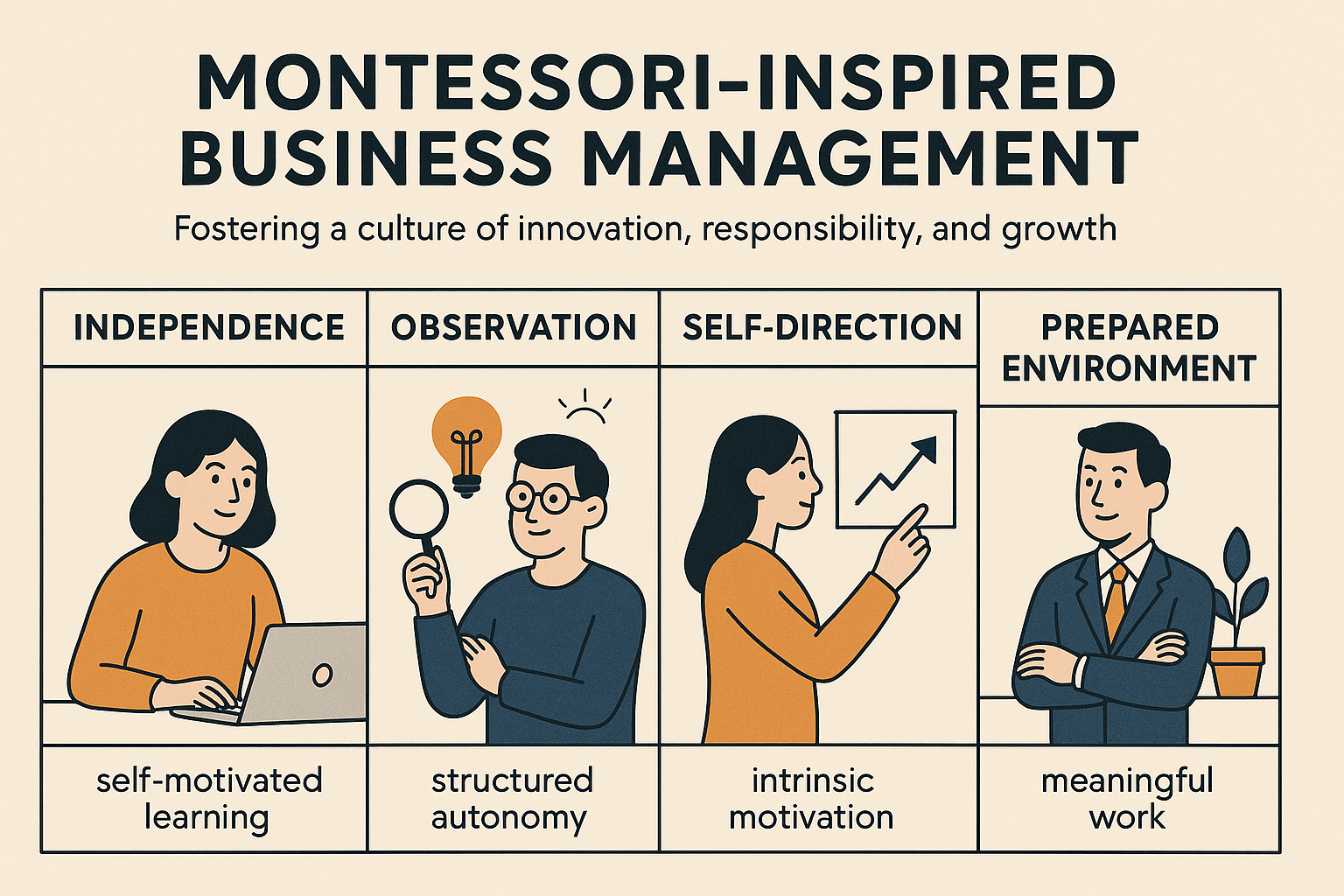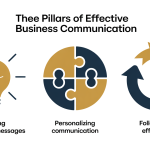
The Unlikely Alliance: What is Montessori and Why Does it Matter in Business?
The name “Montessori” typically conjures images of sunlit classrooms filled with engaged children, meticulously arranging wooden blocks or tracing sandpaper letters.
Developed by Dr. Maria Montessori over a century ago, this educational philosophy is renowned for its child-centered approach, emphasizing independence, observation, self-direction, and a carefully “prepared environment.”
What might surprise many, however, is the profound relevance of these very same principles in the bustling, competitive world of modern business.
Far from being confined to early childhood development, the core tenets of Montessori offer a powerful, yet often overlooked, framework for fostering innovation, responsibility, and sustainable growth within organizations.
By shifting focus from traditional hierarchical control to an environment that cultivates self-motivated learning and structured autonomy, businesses can unlock intrinsic motivation, drive meaningful work, and ultimately, build highly adaptable and thriving workplaces.
What Exactly is Montessori? A Primer Beyond the Classroom
To understand its business application, we must first grasp the essence of the Montessori philosophy.
Dr. Montessori believed that children possess an innate drive to learn and develop, and that the educator’s role is not to simply transmit information, but to facilitate this natural process.
This facilitation hinges on several key pillars:
Independence and Freedom Within Limits:
Children are given the freedom to choose their activities and work at their own pace, fostering self-reliance and decision-making.
This freedom is not absolute; it operates within clear boundaries and expectations, ensuring safety and respect for others.
Observation:
The teacher (or “directress,” as Montessori called them) is a keen observer, meticulously noting each child’s interests, progress, and challenges.
This observation informs how the environment is adapted to meet individual needs.
Self-Correction and Self-Assessment:
Materials in a Montessori classroom are often “self-correcting,” meaning a child can tell if they’ve made a mistake without adult intervention.
This builds problem-solving skills and resilience, shifting the focus from external validation to internal mastery.
The Prepared Environment:
This is perhaps the most critical element.
The classroom is meticulously organized, aesthetically pleasing, and equipped with specially designed materials that invite exploration and learning.
Everything has a purpose and a place, minimizing distraction and supporting concentration.
Intrinsic Motivation:
The philosophy emphasizes that true learning comes from within. Children are motivated by the joy of discovery and mastery, not by external rewards or punishments.
Respect for the Individual:
Each child is seen as a unique individual with their own developmental timetable and learning style. The approach is tailored to foster their unique potential.
Multi-Age Groupings:
Classrooms often mix ages, allowing older children to mentor younger ones and reinforcing their own learning, while younger children benefit from observing and aspiring to more complex work.
At its heart, Montessori cultivates an environment where individuals are empowered to explore, learn, and contribute meaningfully, driven by their own curiosity and desire for mastery.
Why Montessori Matters in Business: Bridging the Gap
Now, let’s draw the parallels. Imagine replacing “children” with “employees,” “teacher” with “manager” or “leader,” and “classroom” with “workplace” or “organization.”
Suddenly, the Montessori principles begin to resonate deeply with modern management challenges.
1. Fostering Independence and Autonomy (Freedom Within Limits)
Traditional business structures often operate on a command-and-control model, where directives flow top-down, and employees are expected to execute without much deviation.
This stifles initiative and creativity.
The Montessori Application:
In a Montessori-inspired business, employees are given significant autonomy over their work.
They are empowered to choose their tasks, decide on the best approach, and manage their time, within clearly defined project goals and organizational objectives.
This isn’t anarchy; it’s structured autonomy.
Just as a child has freedom within the boundaries of the prepared classroom, employees have the freedom to innovate within the strategic framework of the business.
Why it Matters in Business:
- Increased Engagement & Motivation: Autonomy is a powerful driver of intrinsic motivation. When employees feel trusted and responsible for their work, they become more engaged and committed.
- Enhanced Problem-Solving: Empowered employees are more likely to identify and solve problems proactively, rather than waiting for instructions.
- Faster Decision-Making: Decisions can be made closer to the source of the information, leading to quicker responses and greater agility.
- Talent Retention: A culture that values independence is highly attractive to skilled professionals who seek meaningful work and self-direction.
2. The Power of Observation (Data-Driven Leadership)
A Montessori directress doesn’t lecture; she observes. She understands each child’s unique needs by watching them interact with the environment and materials.
The Montessori Application:
For business leaders, observation translates into a deep understanding of their teams and the business environment. This means:
- Active Listening: Genuinely listening to employees, customers, and market signals.
- Data Analysis: Meticulously observing performance metrics, customer feedback, market trends, and internal processes.
- Presence and Engagement: Being present in the “workplace environment” to understand daily workflows, challenges, and successes.
Why it Matters in Business:
- Informed Decision-Making: Leaders can make more effective decisions when grounded in real-time observation and data, rather than assumptions or outdated information.
- Proactive Problem Identification: By observing closely, leaders can spot potential issues before they escalate, much like a directress noticing a child struggling with a particular concept.
- Personalized Support: Understanding individual employee strengths and challenges allows leaders to provide targeted support, development opportunities, and allocate tasks more effectively.
- Innovation through Insight: Deep observation of customer needs and market gaps is often the genesis of groundbreaking products and services.
3. Self-Correction and Iteration (Embracing Failure as Learning)
Montessori materials are designed for self-correction. This process teaches resilience and iterative improvement, without the fear of judgment.
The Montessori Application:
In business, this means creating a culture where:
- Mistakes are Learning Opportunities: Failures are reframed as valuable data points for improvement, not reasons for punishment.
- Feedback Loops are Robust: Systems are in place for teams and individuals to regularly assess their own work and receive constructive feedback.
- Rapid Prototyping and Iteration: Encouraging experimentation and quick cycles of testing and refining, similar to how a child repeatedly tries a self-correcting puzzle until they master it.
Why it Matters in Business:
- Accelerated Learning: Organizations learn and adapt much faster when they embrace continuous improvement and are not paralyzed by the fear of failure.
- Increased Innovation: The freedom to experiment and fail fast is crucial for breaking new ground and developing innovative solutions.
- Employee Resilience: Employees become more adaptable and resilient when they understand that setbacks are part of the growth process.
- Product Quality: Iterative development, informed by self-correction and feedback, leads to higher quality products and services.
4. The Prepared Environment (Optimized Workplaces)
A Montessori classroom is a meticulously prepared space that invites purposeful activity, minimizes distractions, and makes learning materials accessible.
The Montessori Application:
For businesses, the “prepared environment” extends beyond physical space to encompass organizational structure, tools, processes, and culture. This involves:
- Clear Goals and Resources: Providing employees with clear objectives, the necessary tools (software, hardware, training), and access to information.
- Streamlined Processes: Eliminating bureaucratic hurdles and inefficient workflows that impede productivity.
- Psychological Safety: Creating an environment where employees feel safe to voice ideas, take risks, and express concerns without fear of retribution.
- Ergonomics and Aesthetics: Ensuring the physical workspace is comfortable, functional, and aesthetically pleasing, promoting focus and well-being.
- Access to Mentorship/Guidance: Providing structured opportunities for employees to seek guidance from experienced colleagues or leaders, much like a directress offering a lesson when observed ready.
Why it Matters in Business:
- Increased productivity: A well-prepared environment reduces friction and allows employees to focus on value-added work.
- Enhanced Employee Well-being: A supportive and psychologically safe environment reduces stress and burnout.
- Attraction and Retention: Top talent is drawn to and stays with organizations that invest in creating optimal working conditions.
- Reduced Friction, Greater Flow: When the environment is right, work flows more naturally and efficiently.
5. Cultivating Intrinsic Motivation (Purpose-Driven Work)
Montessori education rejects external rewards in favor of nurturing a child’s internal drive to learn.
The Montessori Application:
In business, this means moving beyond purely extrinsic motivators (salary, bonuses) to tap into employees’ inherent desire for:
- Purpose: Connecting individual tasks to the larger mission and impact of the organization.
- Mastery: Providing opportunities for employees to develop new skills, deepen existing expertise, and feel a sense of accomplishment.
- Autonomy: As discussed, giving employees control over their work.
Why it Matters in Business:
- Higher Quality Work: Intrinsically motivated employees are more likely to deliver exceptional quality and go the extra mile.
- Sustained Engagement: Motivation driven by internal factors is more enduring and less susceptible to external fluctuations.
- Innovation: Passionate, purpose-driven employees are often the source of groundbreaking ideas.
- Positive Culture: A workplace where employees feel a sense of purpose and mastery fosters a more positive and collaborative culture.
6. Respect for the Individual (Personalized Growth and Development)
Montessori acknowledges that each child develops at their own pace.
The Montessori Application:
Businesses can apply this by:
- Personalized Development Plans: Tailoring career paths and learning opportunities to individual employee strengths, interests, and growth areas.
- Valuing Diverse Contributions: Recognizing and celebrating the unique skills and perspectives that each team member brings.
- Empathetic Leadership: Understanding and responding to the individual needs and challenges of employees.
Why it Matters in Business:
- Maximized Potential: Investing in individual growth unlocks the full potential of the workforce.
- Reduced Turnover: Employees feel valued and are more likely to stay with organizations that support their personal and professional development.
- Stronger Teams: Diverse teams, where individual contributions are respected, are more innovative and resilient.
Real-World Echoes: Companies Applying Montessori Principles
While few companies explicitly label themselves “Montessori businesses,” many highly successful, innovative organizations instinctively embody these principles:
- Google: Known for its “20% time” policy (allowing employees to dedicate 20% of their work week to projects of their choosing), emphasis on psychological safety, and focus on data-driven decision-making. This aligns with autonomy, self-direction, and observation.
- Netflix: Its culture of “Freedom and Responsibility” where employees are given immense autonomy but held highly accountable for outcomes. This mirrors freedom within limits and self-correction.
- Valve (Video Game Developer): Famous for its “flat management” structure where employees choose their own projects and are organized into self-managing teams. This directly reflects self-direction and a prepared environment that facilitates employee-driven work.
- Morning Star (Tomato Processing): A pioneer in “self-management,” where employees are responsible for their own roles and commitments without traditional managers. This is perhaps the closest real-world embodiment of radical autonomy and self-correction.
These companies demonstrate that when employees are treated as capable, intrinsically motivated individuals within a supportive and well-structured environment, extraordinary outcomes can be achieved.
Conclusion: The Future of Work is Montessori-Inspired
The challenges of the 21st-century business world – rapid change, the demand for continuous innovation, the need for agile teams, and the desire for meaningful work – call for a profound shift in management philosophy.
The traditional hierarchical model, designed for industrial-era efficiency, often falls short in fostering the creativity and self-direction required today.
The Montessori philosophy, born from a deep respect for human potential and an understanding of how individuals truly learn and thrive, offers a compelling alternative.
By consciously applying its principles – fostering independence, keenly observing, enabling self-correction, meticulously preparing the environment, and nurturing intrinsic motivation – businesses can cultivate workplaces that are not just productive, but truly vibrant.
This isn’t about running a business like a classroom; it’s about recognizing the fundamental human needs for autonomy, mastery, and purpose, and building organizational structures that intentionally cater to them.
When employees are empowered to lead their own learning and contribute meaningfully to a shared vision, the result is a dynamic, innovative, and sustainable enterprise where both the business and its people truly flourish.
The unlikely alliance between Montessori and business may well be the blueprint for the future of work.
Go to Montessori Business Main












 productivity
productivity


